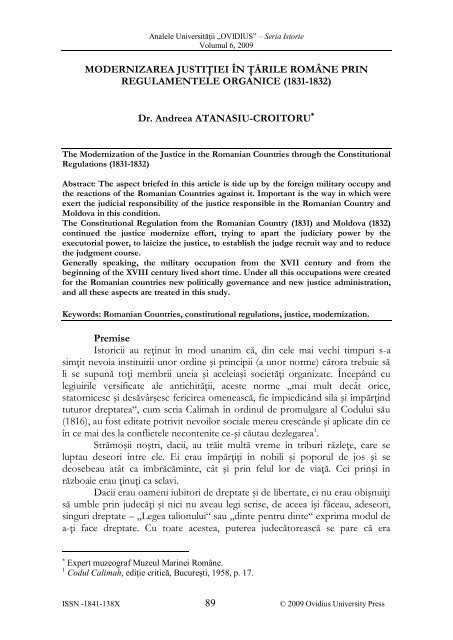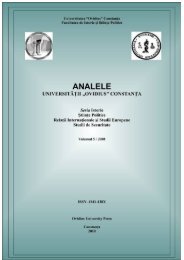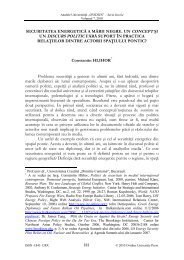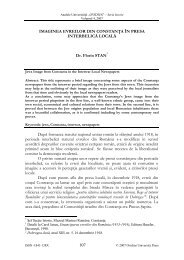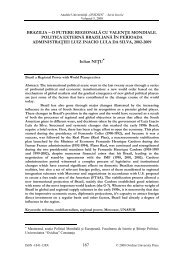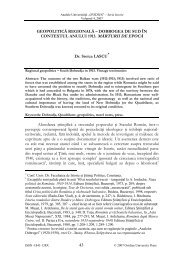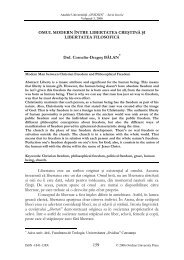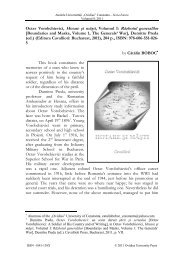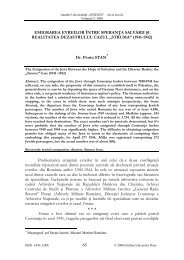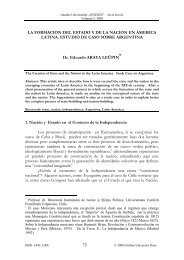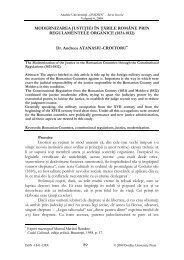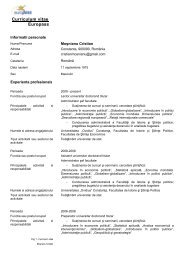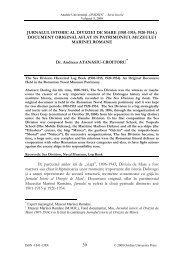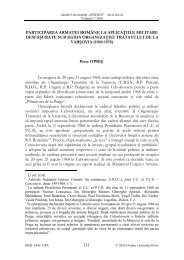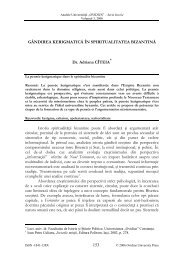analele universitÄÅ£ii âovidiusâ constanÅ£a - AUOCSI
analele universitÄÅ£ii âovidiusâ constanÅ£a - AUOCSI
analele universitÄÅ£ii âovidiusâ constanÅ£a - AUOCSI
Create successful ePaper yourself
Turn your PDF publications into a flip-book with our unique Google optimized e-Paper software.
Analele Universităţii „OVIDIUS” – Seria Istorie<br />
Volumul 6, 2009<br />
MODERNIZAREA JUSTIŢIEI ÎN ŢĂRILE ROMÂNE PRIN<br />
REGULAMENTELE ORGANICE (1831-1832)<br />
Dr. Andreea ATANASIU-CROITORU <br />
The Modernization of the Justice in the Romanian Countries through the Constitutional<br />
Regulations (1831-1832)<br />
Abstract: The aspect briefed in this article is tide up by the foreign military occupy and<br />
the reactions of the Romanian Countries against it. Important is the way in which were<br />
exert the judicial responsibility of the justice responsible in the Romanian Country and<br />
Moldova in this condition.<br />
The Constitutional Regulation from the Romanian Country (1831) and Moldova (1832)<br />
continued the justice modernize effort, trying to apart the judiciary power by the<br />
executorial power, to laicize the justice, to establish the judge recruit way and to reduce<br />
the judgment course.<br />
Generally speaking, the military occupation from the XVII century and from the<br />
beginning of the XVIII century lived short time. Under all this occupations were created<br />
for the Romanian countries new politically governance and new justice administration,<br />
and all these aspects are treated in this study.<br />
Keywords: Romanian Countries, constitutional regulations, justice, modernization.<br />
Premise<br />
Istoricii au reţinut în mod unanim că, din cele mai vechi timpuri s-a<br />
simţit nevoia instituirii unor ordine şi principii (a unor norme) cărora trebuie să<br />
li se supună toţi membrii uneia şi aceleiaşi societăţi organizate. Începând cu<br />
legiuirile versificate ale antichităţii, aceste norme „mai mult decât orice,<br />
statornicesc şi desăvârşesc fericirea omenească, fie împiedicând sila şi împărţind<br />
tuturor dreptatea“, cum scria Calimah în ordinul de promulgare al Codului său<br />
(1816), au fost editate potrivit nevoilor sociale mereu crescânde şi aplicate din ce<br />
în ce mai des la conflictele necontenite ce-şi căutau dezlegarea 1 .<br />
Strămoşii noştri, dacii, au trăit multă vreme în triburi răzleţe, care se<br />
luptau deseori între ele. Ei erau împărţiţi în nobili şi poporul de jos şi se<br />
deosebeau atât ca îmbrăcăminte, cât şi prin felul lor de viaţă. Cei prinşi în<br />
războaie erau ţinuţi ca sclavi.<br />
Dacii erau oameni iubitori de dreptate şi de libertate, ei nu erau obişnuiţi<br />
să umble prin judecăţi şi nici nu aveau legi scrise, de aceea îşi făceau, adeseori,<br />
singuri dreptate – „Legea talionului“ sau „dinte pentru dinte“ exprima modul de<br />
a-ţi face dreptate. Cu toate acestea, puterea judecătorească se pare că era<br />
Expert muzeograf Muzeul Marinei Române.<br />
1 Codul Calimah, ediţie critică, Bucureşti, 1958, p. 17.<br />
ISSN -1841-138X 89 © 2009 Ovidius University Press


